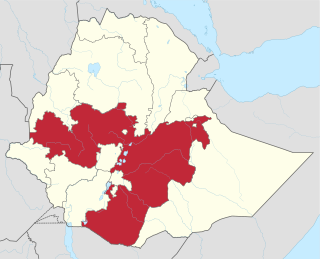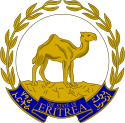
The politics of Eritrea and the government of Eritrea take place in the framework of a single-party presidential republican totalitarian dictatorship. The President officially serves as both head of state and head of government. The People's Front for Democracy and Justice is the only political party legally permitted to exist in Eritrea. The popularly elected National Assembly of 150 seats, formed in 1993 shortly after independence from Ethiopia, elected the current president, Isaias Afwerki. There have been no general elections since its official independence in 1993. A new constitution was drafted in 1993 and ratified in 1997, but has not been implemented. Since the National Assembly last met in January 2002, President Isaias Afwerki has exercised the powers of both the executive and legislative branches of government.

The foreign relations of Eritrea are the policies of the Eritrean government by which it administers its external relations with other nations. Since its independence, Eritrea's foreign relations have been dominated by conflict and confrontation, both in the regional and international arenas. It has maintained often troubled, and usually violent, relations with its neighbors, including brief armed conflicts with Yemen and Djibouti and a destructive war with its bigger-neighbour, Ethiopia. At present, Eritrea has very tense relations with neighboring Ethiopia and Djibouti. Relations in the international arena also have been strained since the last decade, particularly with major powers. What appeared cordial relations with the US in the 1990s turned acrimonious following the border war with Ethiopia, 1998-2000. Although the two nations have a close working relationship regarding the ongoing war on terror, there has been a growing tension in other areas. Ties with international organizations such as the United Nations, the African Union, and the European Union have also been complicated in part because of Eritrea's outrage at their reluctance to force Ethiopia to accept a boundary commission ruling issued in 2002.

The chairman of the government of the Russian Federation, also informally known as the prime minister, is the head of government of Russia and the second highest ranking political office in Russia. Although the post dates back to 1905, its current form was established on 12 December 1993 following the introduction of a new constitution.

The president of the People's Democratic Republic of Algeria is the head of state and chief executive of Algeria, as well as the commander-in-chief of the Algerian People's National Armed Forces.

The president of Ethiopia is the head of state of Ethiopia. The position is largely ceremonial with executive power vested in the Council of Ministers chaired by the prime minister. The current president is Sahle-Work Zewde, who took office on 25 October 2018. Presidents are elected by the Federal Parliamentary Assembly for six years.

Isaias Afwerki is an Eritrean politician and partisan who has been the president of Eritrea since shortly after he led the Eritrean People's Liberation Front (EPLF) to victory on 24 May 1991, ending the 30-year-old war for independence from Ethiopia. In addition to being president, Isaias has been the chairman of Eritrea's sole legal political party, the People's Front for Democracy and Justice (PFDJ). As Eritrea has never had a functioning constitution, no elections, no legislature and no published budget, Isaias has been the sole power in the country, controlling its judiciary and military. Hence, scholars and historians have long considered him to be a dictator, described his regime as totalitarian, by way of forced conscription; the United Nations and Amnesty International cited him for human rights violations. In 2022, Reporters Without Borders ranked Eritrea, under the government of Isaias, last out of 180 countries in its Press Freedom Index. In 2023 Eritrea ranked 174th out of 180 countries on the Press Freedom Index.

The People's Front for Democracy and Justice is the founding, ruling, and sole legal political party of the State of Eritrea. The successor to the Marxist–Leninist Eritrean People's Liberation Front (EPLF), the PFDJ regards itself as a left-wing nationalist party, though it holds itself open to nationalists of any political affiliation. The leader of the party and current President of Eritrea is Isaias Afwerki. The PFDJ has been described as totalitarian, and under its rule Eritrea reached the status of the least electorally democratic country in Africa according to V-Dem Democracy indices in 2023.

The president of Senegal is the head of state and head of government of Senegal. In accordance with the constitutional reform of 2001 and since a referendum that took place on 20 March 2016, the president is elected for a 5-year term, with a limit of two consecutive terms. The following is a list of presidents of Senegal, since the country gained independence from France in 1960.

There have not been national elections in Eritrea since independence in 1993. In theory, elections choose representatives from the country's six regions for the National Assembly. Elections would also occur to elect representatives for the country's regional assemblies and other posts within the country's districts. However, local elections have been regularly held in the past. Eritrea was least electoral democracy in Africa in 2023 according to V-Dem Democracy indices with a score of 0.073 out of 1.

The Eritrean War of Independence was a war for independence which Eritrean independence fighters waged against successive Ethiopian governments from 1 September 1961 to 24 May 1991.

The National Assembly of the State of Eritrea has 150 members, 75 members appointed and 75 members representing the members of the Central Committee of the People's Front for Democracy and Justice (PFDJ), the sole legal political party of Eritrea. According to the IPU, the National Assembly has 150 indirectly elected members. The National Assembly was composed in 1994, and its meeting place is located in Asmara.

The Afar Revolutionary Democratic Unity Front is an Afar political party in Ethiopia, founded in 1993. It had been a member of the United Ethiopian Democratic Forces (UEDF) coalition opposition party.
The Eritrean Army is the main branch of the Eritrean Defence Forces and is one of the largest armies in Africa. The main role of the army in Eritrea is defense from external aggressors, border security, and developing national cohesion. Historically, the predecessor of the Eritrean Army, the Eritrean People's Liberation Front (EPLF), played a major role in establishing and defending the country's independence from Ethiopia in 1991 during the Eritrean War of Independence. Since then, the army has continued to be involved in low-level border conflicts with Ethiopia and several other neighbors, including Djibouti and Yemen, with the most notable one being the Ethiopian-Eritrean War from 1998 until 2000, which ended in a partial Ethiopian military victory and Eritrean boundary line victory. It is widely regarded as one of the largest and more capable armies in Africa, despite the country having a smaller population than most of its neighbors with around 250,000 to 300,000 personnel due to mandatory national service. Conscription became open ended since the war with Ethiopia and no demobilization has taken place.

Eritrea–Sudan relations have historically been tense, but have normalized in recent years.

The President of the People's Republic of China, commonly called the President of China, is the state representative of the People's Republic of China, which on its own is a ceremonial office and has no real power in China's political system. However, since 1993, the post has been held by the general secretary of the Chinese Communist Party (CCP) and chairman of the Central Military Commission, who is China's de facto leader.

The Oromo conflict is a protracted conflict between the Oromo Liberation Front (OLF) and the Ethiopian government. The Oromo Liberation Front formed to fight the Ethiopian Empire to liberate the Oromo people and establish an independent state of Oromia. The conflict began in 1973, when Oromo nationalists established the OLF and its armed wing, the Oromo Liberation Army (OLA). These groups formed in response to prejudice against the Oromo people during the Haile Selassie and Derg era, when their language was banned from public administration, courts, church and schools, and the stereotype of Oromo people as a hindrance to expanding Ethiopian national identity.

Abiy Ahmed is currently the third serving Prime Minister of Ethiopia. In 2018, he became the first ever Oromo descent to assume the role of prime minister in the history of Ethiopia. He won the Nobel Peace Prize in his second year as a prime minister of Ethiopia in 2019 becoming the eighth African laureates to win the award for peace.
The 1995 Ethiopian Federal Constitution formalizes an ethnic federalism law aimed at undermining long-standing ethnic imperial rule, reducing ethnic tensions, promoting regional autonomy, and upholding unqualified rights to self-determination and secession in a state with more than 80 different ethnic groups. But the constitution is divisive, both among Ethiopian nationalists who believe it undermines centralized authority and fuels interethnic conflict, and among ethnic federalists who fear that the development of its vague components could lead to authoritarian centralization or even the maintenance of minority ethnic hegemony. Parliamentary elections since 1995 have taken place every five years since enactment. All but one of these have resulted in government by members of the Ethiopian People's Revolutionary Democratic Front (EPRDF) political coalition, under three prime ministers. The EPRDF was under the effective control of the Tigray People's Liberation Front (TPLF), which represents a small ethnic minority. In 2019 the EPRDF, under Abiy, was dissolved and he inaugurated the pan-ethnic Prosperity Party which won the 2021 Ethiopian Election, returning him as prime minister. But both political entities were different kinds of responses to the ongoing tension between constitutional ethnic federalism and the Ethiopian state's authority. Over the same period, and all administrations, a range of major conflicts with ethnic roots have occurred or continued, and the press and availability of information have been controlled. There has also been dramatic economic growth and liberalization, which has itself been attributed to, and used to justify, authoritarian state policy.


















